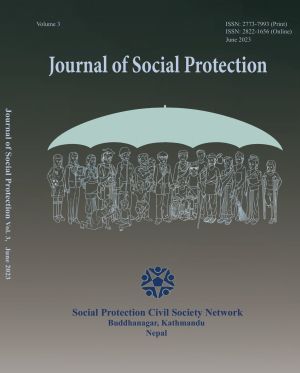Mainstreaming of Social Protection Agenda in the Political Parties' Election Manifesto in Nepal
DOI:
https://doi.org/10.3126/jsp.v3i01.56799Keywords:
Political Ownership, Social Protection, Political Party, Election, ManifestoAbstract
Social protection is indispensable for poverty reduction, a dignified life, and a secure future. According to the concept of a socialist public welfare state, it is the responsibility of the state to provide social security to facilitate the lives of weak, disadvantaged, and vulnerable communities and to ensure quality, safe, and protected lives of all citizens. Thus, social protection agenda are intrinsically political in nature. This paper is based on review of manifestos of various political parties in Nepal for the local, provincial, and federal elections. It was noted that the provisions for education, health, infrastructural development, social protection allowances, shelter, rest homes, care centers, and drinking water among other topics, have been covered in the manifestos of the major political parties. However, the social protection provisions are vague and do not exclusively cover the most vulnerable populations, including children, youths, sexual and gender minority children, and people with disabilities. It further proves that social protection allowances and schemes proposed by political parties are heavily skewed toward elderly citizens. The political parties need to be more capacitated, sensitive, committed, and aware of the multiple dimensions of social protection to ensure complete political ownership of the agenda.
Downloads
Downloads
Published
How to Cite
Issue
Section
License
Copyright for articles is retained by the authors, with first publication rights granted to the journal.

